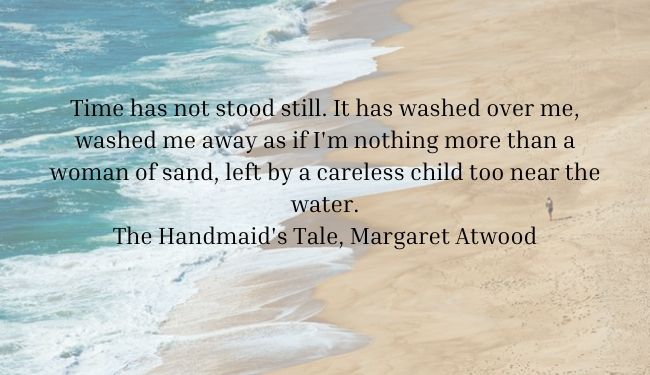

12 Simple Examples of Metaphors with Explanation
Metaphors are everywhere; in literature, visual arts, poetry, and films. Language, in a way, itself is a metaphor. But try to make one on the fly, and you will find out it is not easy. Creating good metaphor requires ingenuity and care. A small mistake can make a metaphor clumsy. So how does one write a good metaphor? Let’s find out.
Table of Contents
Why Metaphors are Important
Metaphors make us understand things better. When feelings are involved or when something happens which has no proper words in our vocabulary, we need something to communicate our experience. Metaphors come in handy in such situations.
Examples of metaphors with their metaphorical meaning
For example, author F. Scott Fitzgerald wanted to describe good writing. He could simply say that good writing was hard or good writing is very difficult. But he chose to say it like this:

All good writing is swimming underwater and holding your breath.
The metaphor “swimming underwater while holding breath” opens a door for us into the experience of Fitzgerald as a writer. That was a very difficult thing to convey in plain words. A whole paragraph might have not sufficed. But here a metaphor has conveyed the meaning completely in a single sentence. Metaphors help us convey meaning by using similarities in different objects and experiences. They relate things with one another and the result is a new understanding of a certain thing. All good poetry and literature do this to create new meanings. Another example is this beautiful metaphor by Shakespeare:
All the world's a stage,
And all the men and women merely players;
They have their exits and their entrances;
And one man in his time plays many parts.As You Like It, William Shakespeare
Metaphors help us use all of our senses in reading a sentence. They make the experience of language more immersive. Take this sentence for example:

Time has not stood still. It has washed over me, washed me away as if I'm nothing more than a woman of sand, left by a careless child too near the water.
The Handmaid's Tale, Margaret Atwood
The writer could simply have said that time has changed me. But the use of sand and water as metaphors has given the whole experience a life of its own. We can hear in our minds the sound of waves when reading the sentence. We can imagine a woman of sand. Good metaphors give a deeper meaning to our words. They can convey meanings for which sometimes whole pages are necessary and sometimes even a book is not enough.
I'm a little pencil in the hand of a writing God.
Mother Teresa
In this small sentence, Mother Teresa has conveyed the whole of her faith. We can get a glimpse of her intimate relationship with God. We can sense her metaphysical experience. This was not possible without the use of a metaphor.
Enjoying this? Here is an article on how to live a life of happiness.
Along with that, plain words can be boring for our minds. Our minds hate repetitiveness and mundaneness and love newness and ingenuity. Metaphors give us this freshness and enliven ordinary language. Language becomes more interesting.
She herself is a haunted house. She does not possess herself; her ancestors sometimes come and peer out of the windows of her eyes and that is very frightening.
The Bloody Chamber, Angela Carter
Simply saying that there is an eerie feeling attached to her the writer could have told us about the character but using a metaphor makes it more interesting and memorable. In addition to that, metaphors add vagueness and abstractedness to our language. This gives readers free rein to make their own interpretations.
There's a bluebird in my heart that
wants to get out
but I'm too tough for him,
I say, stay in there, I'm not going
to let anybody see
you.Bluebird, Charles Bukowski
Nobody has a clear idea of what the bluebird is in this poem and so people make their own interpretations. Good metaphors give us the freedom to read works in the context of our own worldview.
How to Write Good Metaphors?
First of all, start thinking about the thing or experience you want to express. Concentrate on the idea and think about it deeply. Understand it thoroughly. How do you feel about the whole idea?
For example, you want to describe the scene of someone waking up for the first time to the sound of the coming train. Lean into the experience of someone peacefully sleeping in a cozy room under blankets in a comfy bed. Now imagine a train passing over with an ear-shattering sound. What will the character feel like? Imagine it. Now can you compare it to something else that is similar in its sudden experience?
For me, the scene of a car suddenly breaking through the bedroom wall is similar so I would construct my metaphor around that imagery.
He woke up and thought a car had crashed in his bedroom. Everything was moving. His heart was pumping. "Oh! It's the train!" he let out a sigh and shook his head.
If you want to read more about metaphors and their meanings here is an in-depth article on the meaning of metaphors.
Secondly, try using original metaphors in your writing or ones that are rare. Commonly used metaphors are dead in a sense. Some dead metaphors are given here as an example:
- It's raining cats and dogs.
- I'm visiting an old flame.
- He's loose cannon.
- She found herself behind the eight balls.
- He drives me up a wall.
- She saw the light at the end of the tunnel.
- Ticking time bomb
- Tip of the iceberg
- Slippery slope
- Going the extra mile
- Early bird
- Icy personality
- Turning in one's grave
- About to explode (from anger)
Here are some more complex examples of good metaphors. Read them carefully so you can get an idea of how a metaphor works.
1. Books are the mirrors of the soul.
Virginia Woolf describes here the connection between an author and his/her books. Books describe the inner thoughts of the author's mind. That is an experience similar to seeing one's soul. A mirror reflects everything that is in front of it. It does not lie. This small sentence combines these two concepts perfectly to convey a beautiful meaning.
2. "But soft, what light through yonder window breaks? It is the east, and Juliet is the sun!"
Shakespeare is trying to describe the feeling of love that Romeo had for Juliet. The sun is a classic metaphor used in ancient literature to describe a lover.
3. The parents looked upon Matilda in particular as nothing more than a scab. A scab is something you have to put up with until the time comes when you can pick it off and flick it away.
The author here depicts the anger Matilda's parents felt for their child using “a scab on skin”. A person puts up with it because it's painful and messy to remove it before time.
4. "O Lord, You are our Father, We are the clay, and You, our potter; And all of us are the work of Your hand."
In this verse of the Bible, the feeling of helplessness and the might of the All-Mighty God is described. Helplessness is compared with the inertness of the clay. And the potter's hands are the workings of God.
5. Alas, and yet what are you, my written and painted thoughts! It is not long ago that you were still so many-coloured, young, and malicious, so full of thorns and hidden spices you made me sneeze and laugh and now? You have already taken off your novelty and some of you, I fear, are on the point of becoming truths: they already look so immortal, so pathetically righteous, so boring! And has it ever been otherwise? For what things do we write and paint, we mandarins with Chinese brushes, we immortalizers of things which let themselves be written, what alone are we capable of painting? Alas, only that which is about to wither and is beginning to lose its fragrance! Alas, only storms departing exhausted and feelings grown old and yellow! Alas, only birds strayed and grown weary in flight who now let themselves be caught in the hand in our hand! We immortalize that which cannot live and fly much longer, weary and mellow things alone! And it is only your afternoon, my written and painted thoughts, for which alone I have the colours, many colours perhaps, many many-coloured tendernesses and fifty yellows and browns and greens and reds: but no one will divine from these how you looked in your morning, you sudden sparks and wonders of my solitude, you my old beloved wicked thoughts!
Here Nietzsche is describing the thoughts in the human mind which are immortal, ever-changing with infinite possibilities, and how impossible it is to define them truly words.
Conclusion
Good metaphors spice up any piece of art, be it a painting, a poem or a novel. Some writers use whole characters as forms of metaphors, others use symbolism. Learning to write a good metaphor can be a difference between a good piece and a great piece. Here are some other resources you can consult:



Comments